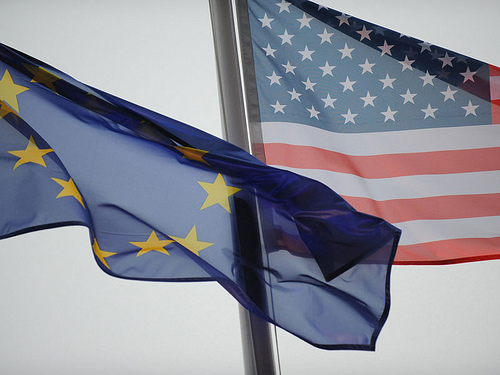
Rough seas ahead for Russia’s attempts to procure Mistral class warships from France, as further disagreement over licensing and sensitive technology stall progress. Poland looks to emphasize European Union expansion in its upcoming stint as EU President, but with Icesave victims Great Britain and the Netherlands in the mix, including Iceland in its plans could scuttle its ambitions.
Headlines:
Iceland in the EU to be pressing issue for Poland’s presidency (Ice News)
Mikolaj Dowgielewicz, deputy foreign minister of Poland, says that enlargement of the European Union and Iceland’s accession to the bloc will be among the top priority issues when his country takes over the EU rotating presidency on 1st July.
Portuguese bail-out expected to push country into recession (EUobserver)
Portugal’s €78 billion EU-IMF bailout is expected to push the country into a two-year recession, outgoing finance minister Teixeira dos Santos has said. The deal will mean “deep reforms and profound changes for our country” said dos Santos, including an overhaul of the public sector and the selling of state-owned stakes in important companies.
South Korea ratifies trade deal with EU (European Voice)
Vote in parliament paves way for ambitious trade deal to take effect in July. South Korea’s parliament yesterday (4 May) ratified a free-trade agreement with the European Union that is expected to bring billions in euros in benefits to trade between the two countries. Most opposition deputies abstained in yesterday’s vote in Korea’s National Assembly.
Merkel Still Trying to Block an ECB President Draghi (Spiegel)
ith former head of Germany’s central bank Axel Weber long-since out of the running, most in Europe see Italian Mario Draghi as a shoo-in for the European Central Bank’s top slot. But not Chancellor Angela Merkel. She is increasingly nervous about installing an Italian, and wants Draghi at the IMF instead.
Mistral talks stumble over sensitive technology (RIA Novosti)
Talks between Russia and France on the purchase of Mistral class helicopter carriers have come to a dead end over Russia’s demands on the transfer and licensed production of sensitive electronics, a Russian defense industry source said on Friday.
Van Rompuy: Europeans too depressed to be innovative (EUobserver)
If Europe is to remain relevant as an innovative economy, people need to be more positive and entrepreneurial and not let themselves be depressed by the economic crisis and subsequent austerity measures, EU council chairman Herman Van Rompuy has said. “Innovation has a lot to do with behaviour, risk taking, motivation and education. You can’t have a society of very creative people only based on financial stimulus,” the former Belgian premier said Wednesday (4 May) during a conference organised by Ernst&Young on innovation and the role of government in supporting it.
French government expels Libyan diplomats (Deutsche Welle)
France has ordered 14 people who served in Paris as Libyan diplomats under leader Moammar Gadhafi to leave the country. This comes as a host of world powers have agreed to support the Libyan rebel campaign.
Russia and Germany meet at sea (Rzeczpospolita)
““Great friendship, great pipe”, headlines Rzeczpospolita the day after completion of Nord Stream, a 1,224-kliometre undersea pipeline which runs from Russia through the Baltic to Germany. Thanks to it, “Gazprom will be able to increase gas export to Europe by 20 percent, notably bypassing key transit countries, that is Ukraine and Belarus”. The Russians managed to convince one of Germany’s largest companies (E.ON) to join the project and build a powerful lobby based on the personal friendship between the former German Chancellor Gerhard Schröder (now a top ranking official in the Nord Stream management) and Russia’s PM Vladimir Putin. “This political lobby turned out stronger than the voice of several EU countries who opposed the construction of the pipeline [on geopolitical and environmental grounds], including Poland,” laments the Warsaw daily, stressing that Nord Stream has been “one of the most controversial investments in Europe in recent years”. (Full Text in Polish)
Merkel pushes for Middle East peace talks after meeting with Abbas (Deutsche Welle)
German Chancellor Angela Merkel has said it’s important to get Israel and the Palestinians back to the negotiation table after meeting with Palestinian President Mahmoud Abbas in Berlin.
EDITORIALS AND COLUMNS:
Supreme Muddle (The Economist)
Europe’s highest courts can be annoying, but they do more good than harm. No wonder Europeans find their institutions so bewildering. What is the difference between the European Council and the Council of Europe? It is not just syntax. The first is the European Union’s top decision-making body, made up of the 27 national leaders. The second is the grandfather of European clubs, which has 47 members (among them Russia and Turkey) and plods along in Strasbourg. Even more confusing, the EU and the Council of Europe share the same blue flag with a circle of 12 stars and the “Ode to Joy” as their anthem. And both have similar-sounding courts. The European Court of Justice (ECJ) sits in Luxembourg and ensures compliance with EU law. The European Court of Human Rights (ECHR), under the Council of Europe, is guardian of the 1950 European Convention on Human Rights.
Royalty will save democracy (Presseurop)
In the wake of the British royal wedding, perhaps the most successful PR achieved by a monarchy in two decades, essayist Ian Buruma argues that monarchies keep countries together, put a lid on ethnic conflicts and dampen down populism.
Image: transatlantic.jpg
